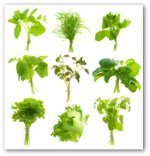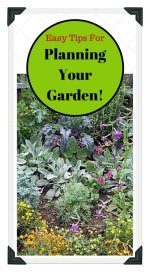Growing Egyptian Onions
in Your Backyard
 Egyptian Onions Growing in the Garden
Egyptian Onions Growing in the GardenHere are a few easy tips for growing Egyptian onions, also known as tree onions, walking onions, perennial onions, winter onions or top onions in home vegetable gardens.
Learn how to grow and harvest Egyptian onions, and also where to buy Egyptian onion sets.
Design Your Own Vegetable Garden Layout Using our Free "Vegetable Garden Planner" Software!
This extraordinary vegetable is not only delicious but self propagating as well!
Self-propagation earned the vegetable its title as Egyptian Walking Onions because of its ability to plant all by itself.
Talk about low-maintenance vegetable gardening!
These hardy little perennial onions are very prolific.
After planting them in your garden, you will have onions every year for years to come.
Planting Egyptian Onions or Walking Onions
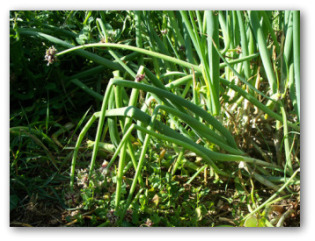 These Egyptian Onions are Getting Ready to "Walk!"
These Egyptian Onions are Getting Ready to "Walk!"After the initial planting, the amazing, tasty onions "walk" across the vegetable plot to replant itself.
This feat is mastered because the bulb of the Egyptian onions blooms on top of the onion.
As the small bulb grows top heavy, it bends over, allowing the onions to root and reproduce a new plant.
Then you will have Egyptian onions all over the place!
Imagine the fascination for children when you show them this unique blooming plant.
Other names for this onion are Tree Onions, Egyptian Tree Onions, Top Onions, Winter Onions, and Perennial Onions.
Growing Egyptian Onions
Growing onions is best accomplished in a well-drained, moist garden bed, but if possible leave room for them to spread and re-plant their bulbs.
You can plant either an underground or above ground bulb-let.
Plant the bulb-let an inch deep and a foot apart.
Hardy Egyptian onions can survive a harsh winter and still be one of the first plants to bloom in the spring.
Although, the plants enjoy full sun, they are cold tolerant and will grow nearly everywhere.
Egyptian onions are on of the earliest plants to emerge in the spring.
Download Free Garden Planning Worksheets, Garden Diary, Zone Chart, Or Planting Guide
The plants are also known as tree onions and researchers believe them to be a cross between the Welsh onion and cultivated onions.
Growing Egyptian onions produce a smaller bulb similar to its relative, the pearl onions.
The plant can grow up to three foot tall flowering. The bulb develops at the flower, much like peppers and tomatoes.
How to Grow Onions
Sandy soils drain quickly so cannot hold on to moisture and nutrients long enough for plants to benefit.
Digging in organic matter "conditions" the soil, which allows it to retain water. Onions prefer fertile, well-drained soil in order to thrive in the vegetable garden.
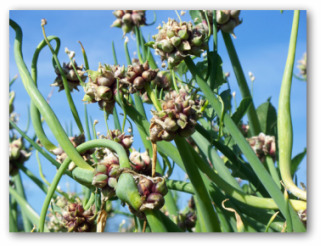 Blooming Egyptian Onion
Blooming Egyptian OnionHarvesting Egyptian Walking Onions
The onion top-sets can be harvested in late summer to early fall.
The top-sets will not usually develop the first year when growing Egyptian Onions.
- Harvest the onion greens at any time.
They have a milder flavor when harvested early in the spring.
- Harvest the onion bulbs growing in the ground in late summer and early fall.
- Leave some of the bulbs in the ground to grow next year's Walking Onion plants.
Egyptian Onion Uses
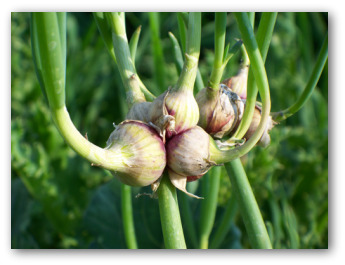 Egyptian Onion Top Sets
Egyptian Onion Top SetsThe purple/red Egyptian onions have a strong taste and the entire plant is edible.
If you are a trying to eat less meat and more veggies, not to worry, just because it walks does not mean it is not a vegetable!
Uses include in vinaigrette and for pickling.
Use the Egyptian onions in hearty stews and homemade soups. The stalks growing in the spring can be prepared like chives or green onions.
Bulbs can be used fresh or stored for later use.
Planting the onion is a delightful project to share with kids, who will want to tell all their friends about growing Egyptian onions.
Where to Buy Egyptian Onion Sets
You can order sets of these onions for planting in your garden from some local gardening centers, or online through a specialty gardening company such as Territorial Seed Company under the category "specialty onions."
Vegetable Gardening Trivia
Onions have been used to treat gunshot wounds since the sixteenth century.
During the American Civil War, General Grant refused to move his troops without an adequate supply of onions.
Kid's Corner
Make a ladybug home project. Ladybugs are good friends of vegetable gardening because they eat a lot of unwelcome insects.
It is easy to make a spot for them to hibernate over winter.
Take an old can, wash it thoroughly, then pack it with wide drinking straws cut to the size of the can.
Toward the end of summer, place the can sideways in a hedge a few feet off the ground so that the rain does not get in, but the ladybugs will have a warm, snug winter haven.
"A gardener should always plant a vegetable garden that fits their family's appetite". ~ Charlotte
You Might Also like to Read:
